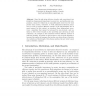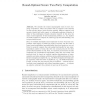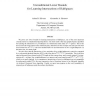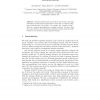19 search results - page 1 / 4 » New Monotones and Lower Bounds in Unconditional Two-Party Co... |
CRYPTO
2005
Springer
13 years 10 months ago
2005
Springer
Since bit and string oblivious transfer and commitment, two primitives of paramount importance in secure two- and multi-party computation, cannot be realized in an unconditionally ...
CRYPTO
2004
Springer
13 years 10 months ago
2004
Springer
Abstract. We consider the central cryptographic task of secure twoparty computation, where two parties wish to compute some function of their private inputs (each receiving possibl...
ASIACRYPT
2005
Springer
13 years 10 months ago
2005
Springer
We propose Gate Evaluation Secret Sharing (GESS) – a new kind of secret sharing, designed for use in secure function evaluation (SFE) with minimal interaction. The resulting simp...
ML
2007
ACM
13 years 4 months ago
2007
ACM
We prove new lower bounds for learning intersections of halfspaces, one of the most important concept classes in computational learning theory. Our main result is that any statist...
EUROCRYPT
2001
Springer
13 years 9 months ago
2001
Springer
Message integrity from one sender to one receiver is typically achieved by having the two parties share a secret key to compute a Message Authentication Code (MAC). We consider the...




